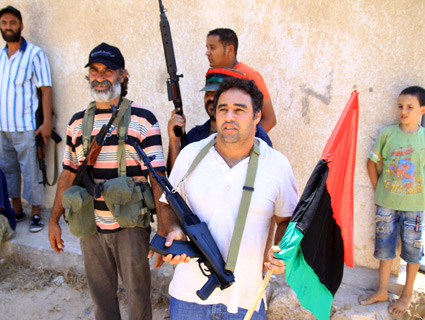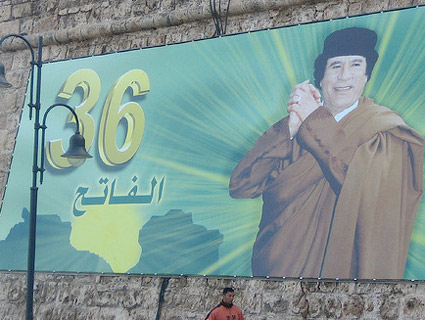
<a href="http://www.flickr.com/photos/21499556@N04/2568931976/">Ammad Abd Rabbo</a>/Flickr
Whether you believe the body count of the Libyan government (300), the Italian government (1,000), a French doctor-witness (2,000), or a member of the International Criminal Court (10,000), one thing remains undisputed: terrible, terrible things are happening in Libya.
Yesterday, UN Secretary-General Ban Ki-moon made a statement condemning the violence, saying that “Those responsible for brutally shedding the blood of innocents must be punished.”
Those are pretty strong words. But what they are not is a resolution. If you’re thinking that the UN is theoretically supposed to actually do the punishing the secretary general is referring to, you would be correct: In 2005, its member nations agreed to the Responsibility to Protect doctrine, which stipulates that if a government starts slaughtering its own people the UN is responsible for taking “timely and decisive” action. I’ve blathered at length about cases where the UN has failed to do this, but the Guardian‘s Carne Ross puts it fantastically in regards to Libya:
What is happening in Libya is the true test of such declarations, and it is for every UN member, including the UK and US, in their positions as permanent members of the council, to declare loud and clear—and now—that this principle must be respected, and if it is not, that consequences will follow.
A possible UN resolution could say that if dictator Muammar Qaddafi doesn’t stop the slaughter, the international community will freeze his regime’s assets, resort to sanctions, or even force. It must be really hard, though, to get something like that together; with all the states involved and China and Russia predictably pulling the old “we shouldn’t interfere with other people’s business, especially people who sell oil” card, it certainly takes a super long time to pass a resolution. Right, Ross?
I spent four and a half years negotiating resolutions on the Middle East at the UN Security Council. When it wishes, the council can make decisions in hours. We agreed a resolution condemning the 9/11 attacks in less than an hour, the morning after the attacks took place.
Alright, well, there’s that. When it comes to the lack of meaningful UN action on Libya, it’s not disorganization, or excessive bureaucracy to blame—just a healthy dose of sacklessness.













